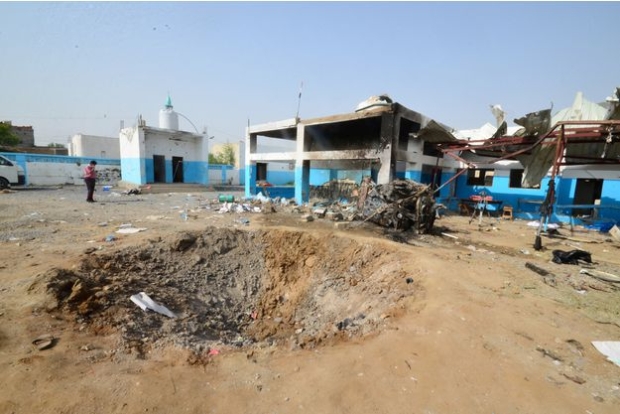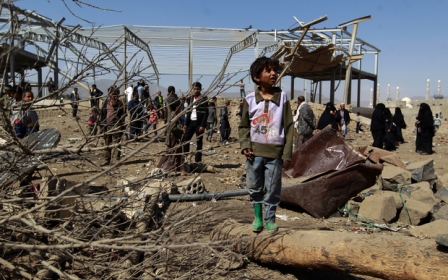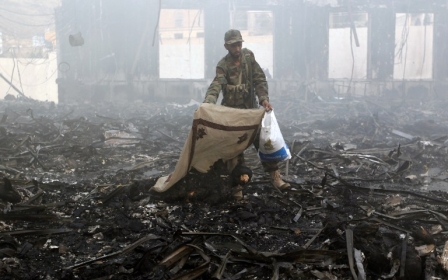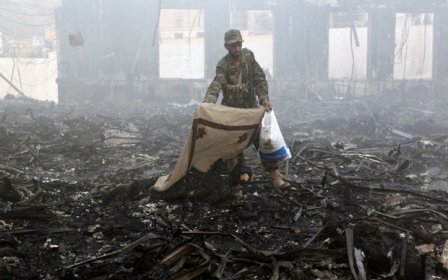UK government denies it ignored advice over Saudi arms sales

The British government used its “considerable insight” into the actions of the Saudi Arabian military to make its decision to continue arms exports to the kingdom, a London court heard on Wednesday.
James Eadie QC told the High Court that in considering whether to halt the sales of weapons to Saudi Arabia in February 2016, government ministers used significant “understanding and knowledge" of Saudi processes to make a “considered analysis”.
But the government's lawyer also appeared to defend Saudi strikes on hospitals and school buildings by saying they could serve as “arms dumps” and could in some circumstances be considered “dual-use” targets, making air strikes legitimate.
According to evidence presented by the government, ministers discussed arms exports to Saudi Arabia at the "highest levels," and relied on expert evidence from the Foreign and Commonwealth Office (FCO) and Ministry of Defence (MoD) officials to reach their conclusions.
READ: UK government 'ignored advice and continued Saudi arms sales'
Eadie is defending the government against a judicial review brought by Campaign Against the Arms Trade (CAAT). The group, which has campaigned against arms sales since 1974, is hoping the case will lead to the suspension of UK arms sales to Saudi Arabia.
The court hearing on Wednesday also saw the release of a number of documents focusing on the close ties between the British military and the Saudi forces engaged in the ongoing conflict in Yemen.
In spite of human rights fears over Saudi Arabia’s bombing campaign in Yemen, Britain has exported £3.3bn ($4.1bn) of weapons to the kingdom since 2015, including fighter jets and munitions.
On Tuesday lawyers for CAAT argued that Sajid Javid, the then-business secretary with decision-making responsibility for arms exports, had ignored the advice of his own arms control expert. They presented an email to the court from Edward Bell, the policy head of the Export Control Organisation. It detailed how Bell had told Javid that his “gut tells me we should suspend”.
The court also heard that officials within the MoD had removed a column in a tracking system dedicated to recording violations of international human rights law (IHL).
Defending the government's position, Eadie told the court that officials and ministers at the then Department for Business Innovation and Skills (BIS), which had decision-making power over arms exports, made their decision after rationally examining the evidence and the so-called “consolidated criteria” for arms exports.
READ: Saudi weapons sales face landmark review in British court
“The relevant question for the secretary of state is whether there is a clear risk that the items to be licensed might be used in the commission of serious violations of international humanitarian law (IHL). That has been the question consistently addressed by the secretary of state,” he said in his written submission to the court.
Eadie also told the court that Javid, who is now minister for communities and local government, had sought assistance from senior civil servants at the FCO and MoD, as well as then foreign secretary Philip Hammond. Since the case was brought, the role of approving arms exports has been transferred to the new Department of International Trade. He also said officials examined Saudi Arabia's IHL record, its public statements and its willingness to engage in dialogue to make the decision to continue exports.
Arms traders not 'auditors of foreign states'
The government’s legal team rejected demands that civil servants must fully investigate each and every allegation of IHL violations. “It is difficult to think those who set criteria for arms sales intended to set themselves up as auditors of foreign states’ conduct of conflict,” Eadie said.
In a defence of Saudi Arabia, he also said the evidence showed that the country is “not a state flagrantly and wantonly violating IHL. It knows the eyes of the world are on it.”
To the dismay of campaigners, he said hospitals and school buildings that were targeted by the Saudis could serve as “arms dumps”. He said they could in some circumstances be considered “dual-use” targets, making air strikes legitimate.
Documents presented to the court also revealed the full extent of Britain’s military relationship with Saudi Arabia:
- More than 100 civil servants and armed forces personnel are based in Saudi Arabia to “ensure the supply of modern military aircraft, naval weapons and training”.
- British personnel and officials are based in the Saudi-led coalition’s operational headquarters, where the conflict in Yemen is overseen and air strikes are planned.
- The defence attache at the British Embassy in Riyadh regularly visits the coalition's operational headquarters. The officer who currently holds this role is a one-star general rank. The only British defence attache more senior in rank is based in Washington.
- The British Royal Air Force has a permanent liaison officer of group captain rank based in Riyadh.
- UK military personnel provide logistical and technical support and training to the Royal Saudi Armed Forces.
- UK liaison officers are also based at the Saudi Arabian Ministry of Defence, the Royal Saudi Air Force headquarters.
- UK officers have “knowledge of targeting guidance” given to Saudi forces operating in Yemen.
Sensitive evidence to be heard in private
The remainder of the judicial review, which ends on Friday, is due to be held in secret to protect sensitive government sources. These are expected to include MoD surveillance satellite images of bomb sites in Yemen as well as top-secret intelligence reports.
Lord Justice Burnett and Justice Haddon-Cave will also examine the full text of a UN report to the Security Council, which includes Britain.
The report was partially leaked to Reuters last month and British ministers were compelled to hand it over to the court. According to Reuters, the report shows that the Saudi-led coalition has carried out attacks in Yemen that “may amount to war crimes”.
The report found that in eight out of 10 cases examined there was no evidence that air strikes had targeted legitimate military objectives.
The MoD’s own figures show it has tracked or is tracking 251 allegations of violations of international humanitarian law by Saudi forces in Yemen.
The case continues.
New MEE newsletter: Jerusalem Dispatch
Sign up to get the latest insights and analysis on Israel-Palestine, alongside Turkey Unpacked and other MEE newsletters
Middle East Eye delivers independent and unrivalled coverage and analysis of the Middle East, North Africa and beyond. To learn more about republishing this content and the associated fees, please fill out this form. More about MEE can be found here.





